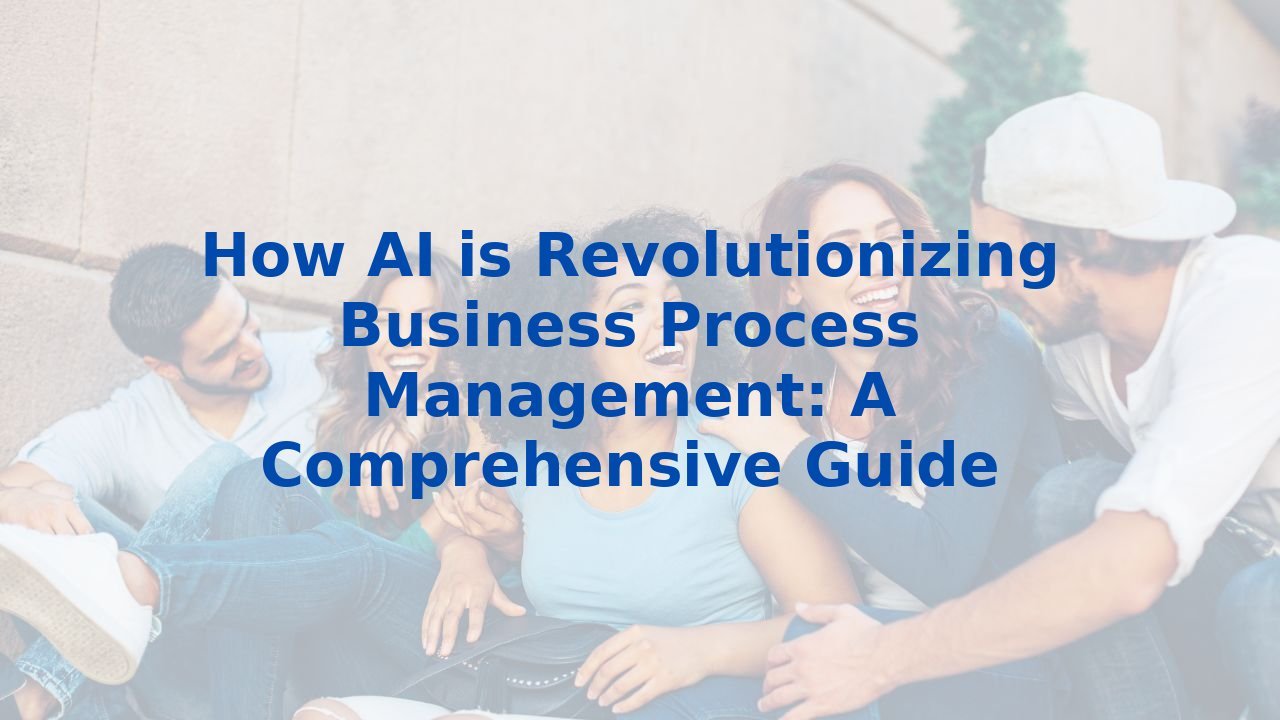How AI is Revolutionizing Business Process Management: A Comprehensive Guide
How AI is Revolutionizing Business Process Management: A Comprehensive Guide
In a world where speed is crucial and efficiency is a must, businesses are continuously searching for innovative ways to optimize their operations. Enter Artificial Intelligence (AI), a game-changer that is revolutionizing Business Process Management (BPM). This guide delves into the myriad ways AI enhances business processes, showcasing its power to improve efficiency and decision-making across the board.
Understanding AI in Business Process Management
AI in BPM encompasses the use of intelligent technology to build, analyze, automate, and optimize workflows. By leveraging AI, organizations can streamline operations, conduct sophisticated data analyses, and automate repetitive tasks, dramatically reducing the time and resources traditionally needed for manual processes.
Key Components of AI in BPM
The transformative impact of AI in BPM can be understood through its three core components:
- Data Analysis: AI excels at sifting through vast troves of data, uncovering trends, predicting outcomes, and providing crucial insights for better decision-making.
- Process Building: AI efficiently constructs new workflows based on specified parameters, ensuring processes are not just created but optimized for peak performance.
- Automation: By automating manual tasks, AI reduces labor costs and human error, allowing for high-accuracy execution of repetitive tasks.
The Benefits of Embracing AI in BPM
Integrating AI into BPM doesn’t just streamline processes; it transforms them. Let's explore some key benefits:
- Improved Efficiency: With AI taking over routine tasks, employees can redirect their focus onto strategic initiatives, fostering an environment of increased productivity.
- Enhanced Decision-Making: AI's predictive capabilities provide invaluable data-driven recommendations, allowing organizations to make informed choices swiftly.
- Risk Minimization: AI helps detect unusual patterns in data, enabling companies to proactively address potential risks before they escalate.
- Process Optimization: AI enhances process simulation and analysis by revealing bottlenecks and estimating the impacts of proposed process changes.
Applications of AI Across Business Processes
The potential applications of AI in BPM are vast and varied, permeating every aspect of the enterprise:
- Core Processes: AI can significantly enhance operations such as production, marketing, customer support, and product development by introducing higher levels of automation and process optimization.
- Support Processes: Areas like IT service management, recruiting, and procurement stand to benefit from AI's streamlining capabilities.
- Longtail Processes: AI holds the power to optimize nuanced activities such as contract reviews, vendor approvals, and budget requests, ensuring seamless operations throughout.
AI’s Role in HR and Sales
The combination of AI with human resources (HR) and sales processes amplifies their efficiency manifold:
- HR Applications: AI can enhance objectivity and increase the overall quality of employee experiences by automating administrative tasks and personalizing career pathways.
- Sales Applications: From optimizing lead scoring to drafting targeted content, AI facilitates a more effective and efficient sales process, allowing businesses to prioritize leads and identify upselling opportunities intuitively.
Continuous Improvement Through AI
Continuous improvement is pivotal for any business. AI reinforces this concept by providing ongoing feedback, performance insights, and data-driven recommendations. By iteratively optimizing processes based on AI's guidance, organizations can ensure they remain agile and evolve with the market shifts.
The Importance of Training Employees for AI Integration
While the integration of AI offers remarkable efficiencies, it’s equally important to equip employees with the skills necessary to harness this technology. Comprehensive training helps personnel understand how to leverage AI effectively, automate relevant tasks, and nurture improved decision-making capacities. By balancing AI strengths with human insight, organizations can enhance their BPM initiatives substantially.
Conclusion
The infusion of AI in Business Process Management is reshaping the landscape of organizational efficiency and decision-making. By embracing AI's capabilities, organizations can not only streamline operations but also cultivate a culture of continuous improvement and adaptation. As you navigate this dynamic environment, remember that the synergy between AI and trained employees lies at the core of enduring success. Investing in AI Training will further ensure your organization is equipped for the future.



